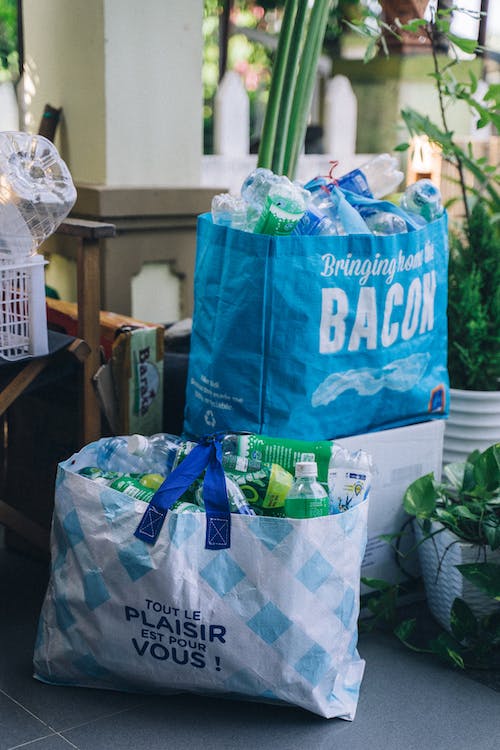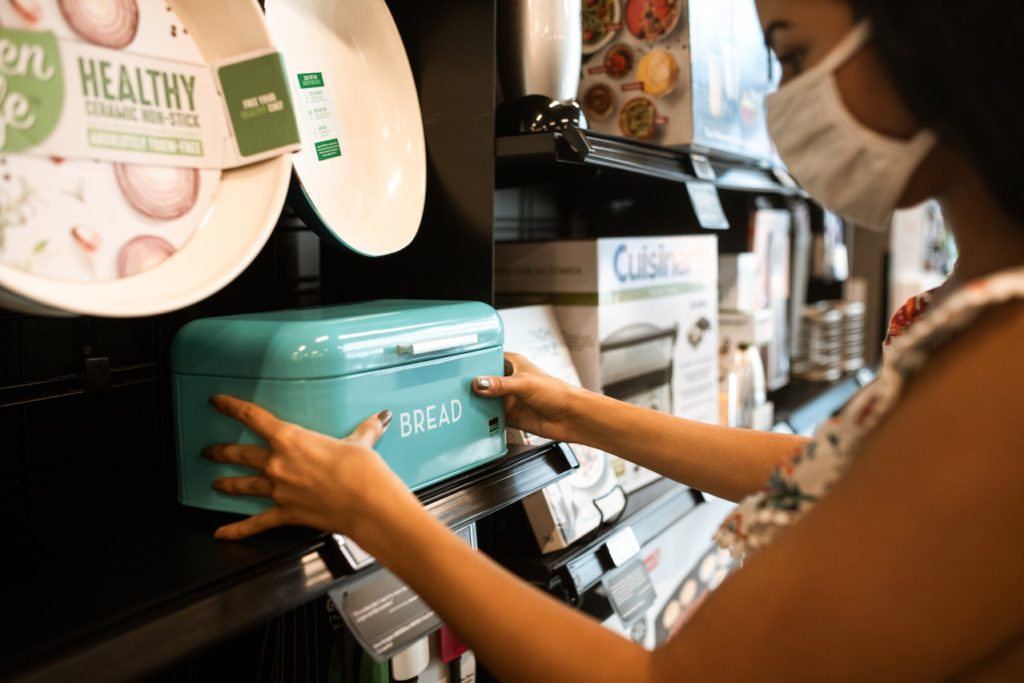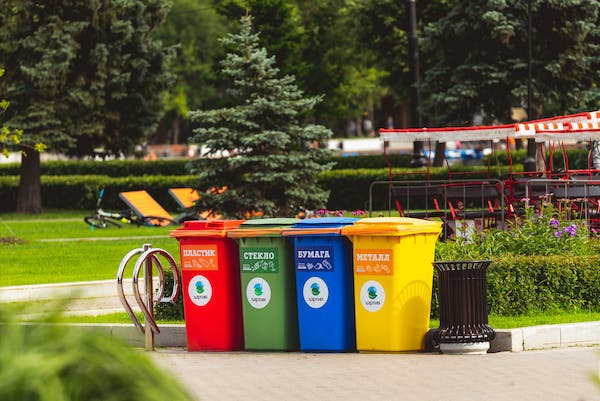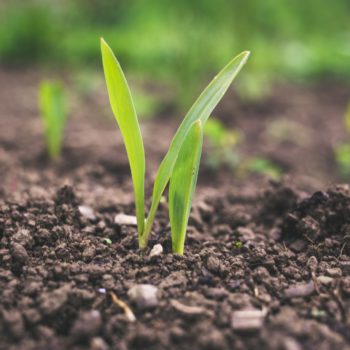|
|
Embracing a zero-waste lifestyle is a decisive step towards a more sustainable and environmentally conscious way of living. In a world where plastic consumption is rampant, numerous ways exist to make a positive impact.
From simple everyday changes to more intentional choices, this guide explores 15 easy and effective ways to start reducing waste and get you started on your journey towards a zero-waste lifestyle.
By implementing these practical strategies, you’ll contribute to a healthier planet and discover the joy and fulfillment of living mindfully and sustainably.
What is Zero Waste?

Zero waste is a philosophy that seeks to minimize waste output and ensure that no waste is in landfills or incinerators.
Here are some key facts about zero waste from the World Economic Forum:
- Zero waste originated in the 1970s, coined by chemist Paul Palmer.
- The 5 Rs guide it: refuse, reduce, reuse, recycle, and rot.
- Opting for a zero-waste approach can slash waste management emissions by 84%.
- In the U.S., approximately 146 million tons of waste find their way to landfills each year. Food constitutes a significant portion of landfill waste, accounting for about 24%.
- The U.S. food system consumes a staggering 10.11 quadrillion British thermal units (Btu) of energy.
- Clothing production demands an astonishing 79 billion cubic meters of water annually.
- Between 2010 and 2019, global e-waste reached a massive 53.6 million metric tons. Recycling generates roughly nine times more jobs than landfill disposal. Composting generates about double the employment opportunities compared to landfill disposal.
The goal is to send nothing to the landfill and reuse or recycle everything. Going zero waste is a powerful initiative that provides a strong foundation for building a more environmentally conscious future.
How can zero waste benefit the environment?
Adopting a zero waste lifestyle can have numerous benefits for the environment. By reducing waste and diverting it from landfills, we can conserve resources, reduce greenhouse gas emissions, and minimize pollution. It also helps conserve energy and reduce the use of raw materials, leading to a more sustainable future.
15 Ways on How to Start Your Zero Waste Lifestyle
1. Assess your current waste habits
The first step in transitioning to a zero waste lifestyle is to assess your current waste habits. Take stock of the amount of waste you produce and identify areas where you can improve. This could include reducing single-use plastics, minimizing food waste, or finding alternatives to disposable products.
2. Set achievable goals for reducing waste
Once you clearly understand your waste habits, set achievable goals to reduce waste in specific areas. Start small and gradually increase your efforts as you become more comfortable with the changes. Remember, every step counts and even the smallest actions can significantly impact.
3. Create a zero waste action plan
To effectively transition to a zero-waste lifestyle, creating a comprehensive action plan can be helpful. Identify the changes you want to make and outline your steps to achieve them. This could include purchasing reusable items, starting a composting system, or finding local recycling options for hard-to-recycle items.
4. Reduce food waste in your kitchen
Food waste is a significant contributor to overall waste production. Plan your meals and shop with a grocery list to reduce food waste in your kitchen to avoid overbuying. Utilize leftovers creatively, freeze excess food, and compost any food scraps that cannot be consumed.
5. Compost food scraps
Composting is a valuable practice that helps divert organic waste from landfills and produces nutrient-rich soil for your garden. Composting food scraps can reduce methane emissions from decaying organic matter and create a sustainable cycle of nourishing the earth.
6. Have a proper food storage
Proper food storage is essential for minimizing waste. Store perishable items in airtight containers or beeswax wraps to extend their shelf life. Use glass jars to store bulk items and invest in reusable produce bags to eliminate the need for single-use plastic bags.

7. Reuse common household items
Reusing common household items is a great way to reduce waste. Find alternative uses for items like glass jars, plastic containers, or old clothing. Repurpose them into storage containers, plant pots, or even arts and crafts materials.
8. Repurpose ideas for old clothing and furniture
Instead of discarding old clothing or furniture, consider repurposing them to give them a new life. You can turn old t-shirts into cleaning rags or transform an old dresser into a unique statement piece. Repurposing not only reduces waste but also showcases your creativity.
9. Create zero waste products
Creating your zero-waste products can be a fun and rewarding endeavor. Make your natural cleaning solutions, personal care items, or even fashion accessories. By making these products at home, you can reduce packaging waste and have control over the ingredients used.
10. Reduce waste in your bathroom
The bathroom is an area where a lot of rubbish is generated. Switch to eco-friendly alternatives such as bamboo toothbrushes, refillable soap dispensers, and menstrual cups. Opt for package-free products or those with minimal packaging to minimize waste.
11. Reduce waste in your grocery shopping
Grocery shopping is an opportunity to make meaningful choices to reduce waste. Bring your own reusable bags, buy in bulk to avoid excess packaging, and choose products with eco-friendly packaging. Be mindful of the impact your choices have on waste production.
12. Switch to eco-friendly options in your cleaning routine
Cleaning products often come in single-use plastic containers and contain harmful chemicals. Switch to eco-friendly alternatives such as homemade cleaners or refillable options. Look for products with biodegradable or recyclable packaging to minimize waste.

13. Avoid single-use plastics while traveling
Traveling can often lead to increased waste generation. Pack a reusable water bottle, utensils, and a cloth bag to carry your essentials. Avoid single-use plastic items such as straws and disposable cutlery by bringing your reusable alternatives.
14. Make a conscious effort when eating out and getting takeout
When eating out or getting takeout, make conscious choices to reduce or eliminate waste. Bring your containers for leftovers, or opt for restaurants that use compostable or reusable packaging. Minimize the use of plastic utensils and ask for sauces in bulk rather than individual packets.
15. Choose sustainable transportation options
Transportation contributes significantly to carbon emissions and waste production. Choose sustainable transportation options for biking, walking, or public transit when possible. Carpooling or using ride-sharing services also helps reduce the overall carbon footprint.
Frequently Asked Questions
A zero waste lifestyle is where you aim to produce as little waste as possible. It involves reducing, reusing, and recycling materials to minimize environmental impact.
While achieving zero waste may seem challenging, it is undoubtedly attainable for everyone. Although some may find it easier than others, it’s essential to remember that even small steps toward zero waste can make a significant difference. It’s not about being perfect but about making conscious choices to reduce waste in every area of your life.
There are many ways to start living a zero waste lifestyle. You can begin by being mindful of your consumption habits and making small changes, such as using reusable bags, bottles, and containers. It’s also important to prioritize buying products with minimal packaging and to recycle or compost whenever possible.
Adopting a zero waste lifestyle has several benefits. It helps conserve resources, reduce pollution, and minimize much waste sent to landfills. It also promotes sustainable living and can save you money in the long run by reducing your need to buy new items.
There are several easy ways to reduce waste at home. You can start by composting food scraps, using reusable bags and containers, and opting for products with minimal packaging.
You can also avoid single-use items whenever possible and prioritize buying second-hand or repurposed items.
Reducing plastic waste is an important aspect of living a zero waste lifestyle. You can start by using reusable shopping bags, reusable water bottles, reusable containers, and reusable cutlery, opting for products that come in non-plastic packaging, and avoiding single use plastic items. Additionally, you can recycle any plastic waste that you do generate.
There are numerous ideas for zero waste living. Some include making your own cleaning products, buying in bulk to reduce packaging waste, repurposing items instead of throwing them away, and avoiding disposable items like paper towels and plastic cutlery.
To start reducing waste in different areas of your life, you can take small steps such as using cloth napkins instead of disposable ones, bringing your own bags or containers when shopping, and carrying a reusable straw. You can also focus on minimizing food waste, using eco-friendly cleaning products, and opting for sustainable transportation options.
Making your lifestyle more eco-friendly involves adopting sustainable practices in various aspects of your life. This can include using public transportation or biking instead of driving, conserving energy and water at home, and choosing products made from recycled materials. It’s also important to educate yourself and others about environmental issues.
There are many zero waste products available that can help you reduce waste in your everyday life. Some examples include stainless steel straws, reusable grocery bags, beeswax wraps as an alternative to plastic wrap, and reusable coffee filters.
Getting started on a zero waste lifestyle is all about taking small steps and making gradual changes. Begin by analyzing your waste production, setting goals for reducing waste, and implementing sustainable practices one at a time. Don’t be too hard on yourself if you make mistakes; keep striving towards a zero waste life.
Conclusion
By incorporating these 15 easy ways to start living a zero waste lifestyle, you can significantly reduce your waste output and contribute to a healthier planet. Remember, the journey towards zero waste is continuous, and even small changes can have a lasting impact. Start today and be part of the zero-waste movement!












